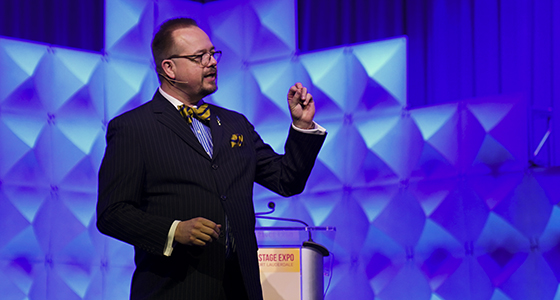By: David Grindle, USITT Executive Director
A recent article in American Theatre had the title Taking the Hell out of Hell Week. I must admit that in my current position, our definition of tech week is Conference week, or the week prior to any event. Prior to this position, however, I got to experience tech week for opera, dance, plays, musicals, and classical ballet across my career. And very early on I saw the truth behind a self-fulfilling prophecy.
Sociologist Robert Merton is credited with the term, but the concept is as old as humanity itself. If you believe something will come true, it is more likely to come true. Interestingly, I find that I associate self-fulfilling prophecy with negative things more than positive. But either way, tech week can often be a self-fulfilling prophecy.
In the American Theatre article, there was some interesting discussion about how some theatres are adapting schedules to tech in the manner best appropriate for the show. Longer tech for more complicated shows versus shorter for those less so. But it was a comment from sound designer Elisheba Ittoop that really caught my attention. She mentioned that the company set a positive, respectful tone for the show from the beginning and had everyone see each other as people, not job titles.
All too often we look at something and think, “that’s going to be hell.” But is it? It will be hard, it will be challenging, but will it be hell? Whether you are religious or not, hell has a defined meaning. In literature it is a place of eternal pain and suffering. That’s not really what we do. Sure, I have had some shows that were challenging. I’ve had colleagues that could have been more helpful or congenial. But then I could have been that way to others too.
If we approach our challenges with a negative view, they will be negative. As a production manager, I banned the term hell week. You could call it the week of challenges. The period of opportunity. Even the marathon of patience. But it had to have a positive bent to it. With that little moment you make a difference in how you view things. Just like the humanizing moment Ittoop described, it changed the tenor of the room.
Part of the joy of producing a show is seeing it come together. If I had to pick a “favorite part” of production, I think it would be tech. I found it challenging. Could I schedule things efficiently? Could we discover some new artistic moment when it all came together? Could I call a sequence properly and unite the magic that was everyone’s artistic creation? Those were the challenges I looked forward to. And they all came to an end because the show always opened (with one notable exception due to the Blizzard of 1993).
If it is hell, why are we doing it? Teddy Roosevelt said “Nothing in the world is worth having or worth doing unless it means effort, pain, difficulty…” and while that may sound challenging, it isn’t hellish.
